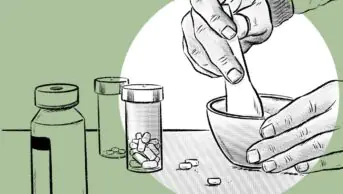
Norma Jean Gargasz / Alamy Stock Photo
An English-language version of a Netherlands-based website which sells kits to patients to help them wean themselves off antidepressants and other psychiatric drugs has been launched.
Each kit includes a tapering strip of medication packaged in a roll of small daily pouches. Each pouch is numbered and has the same or a slightly lower dose than the one before.
Tapering strips — designed for a 28-day cycle — are available for a number of antidepressant, antipsychotic and sedative medicines; strips for weaning patients off lithium and tramadol are also available.
Patients can use the strips to regulate their dose reduction over time, according to the website; information printed on each pouch allows them to precisely record and monitor their progress.
MHRA concern
The UK medicines regulator confirmed today (Tuesday 11 July) that it is aware of the site, but as it is hosted in the Netherlands it has no jurisdiction over it.
The Medicines and Healthcare products Regulatory Agency (MHRA) has, however, contacted the Dutch regulatory organisation, the Medicines Evaluation Board, to discuss the site.
A MHRA spokesman explained that it is open to a UK patient to buy a kit from the website. Because the purchase is being made outside the normal UK drug supply chain, a UK prescription is not required — even though the strips are made up of prescription-only medicines (POMs).
“Although POMs can be imported for personal use, self-medication is potentially risky and we advise against this,” he said.
Dutch initiative
The new website is an English-language version of an established Dutch site, which has been developed in a collaboration involving pharmacist Paul Harder from the Regenboog Apotheek, the charity the Cinderella Therapeutics Foundation and the user research centre at the department of psychiatry and psychology at the University of Maastricht. All are based in the Netherlands.
Harder told the Pharmaceutical Journal that medication would not be prescribed to patients in the UK without a prescription.
He said: “Patients in the UK should ask their doctor to fill in an order form on the website, this serves as a prescription. The GP must sign the form and provide their medical registration number along with contact details.”
However, Harder was not able say how he would verify the credentials of the person signing the form, as no formal arrangement had been made with the medical profession in the UK.
He added that he would be contacting officials in the UK to discuss this further but admitted that in the meantime the website could potentially be open to abuse.
Dr Peter Groot, from the university’s user research centre, said it had decided to launch the English-language version of the site following contact with lobby groups and individuals in the UK who are campaigning for more help to support patients who want to be weaned off psychiatric drugs.
He told The Pharmaceutical Journal: “This is something that we had planned for some time ago. This problem [weaning patients safely off psychiatric drugs] has been known for a long time. The problem for doctors and pharmacists is that the right medicines for tapering are not [readily] available.”
A statement on the university’s website points out that Cinderella Therapeutics is a non-profit foundation and works with volunteers with the aim of making ‘stepchild’ drugs available to patients at an affordable price.
The university’s user research centre and the charity have no financial interest in the development or provision of tapering strips, the statement claimed.
In the UK the doctors’ trade union, the British Medical Association, has been campaigning for more support for doctors for helping to wean patients off drugs prescribed to treat psychiatric disorders — including guidance on tapering medicines.
A change.org.uk petition by James Moore — who has personally battled to come off drugs prescribed to treat his depression and anxiety — calls on the UK government to allow tapering strips to be made available to help patients weaning themselves off psychoactive drugs. It has attracted 2,072 signatures.
Moore said: ”This is groundbreaking work from a highly respected academic institution and it needs support and for the regulators to get properly engaged rather than focus on prohibition. Patients have little option when they withdraw and the Royal College of Psychiatrists found that 63% of people taking antidepressants suffer withdrawal effects and many suffer for prolonged periods. There are even cases where users have taken their own lives because of the severity and protracted nature of withdrawal.”
- 13 July 2017. 17.40. This story was updated to include comments from Paul Harder and James Moore.


